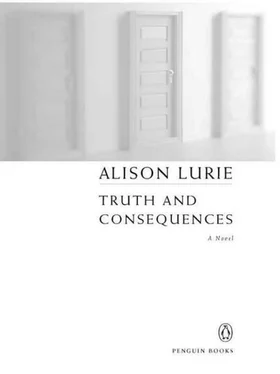“Lots of people were turned away, and that made them angry and frantic. They felt they had a right to call me on the phone, and come here to get their books signed and ask the questions they didn’t get to ask.”
“Yes, you told me,” he said impatiently.
“I haven’t been able to work since then, not really, you know. Even when I lock the door and don’t answer the phone, I know they’re out there, on their way. Soon they’ll be here and then they’ll call, and pound on the door and leave messages and notes. They push them under the door sometimes; I can see them sliding into the room like slimy flat white fish. They all want me to read their manuscripts and recommend agents and editors and publishers and be their best friend. You know how it’s been, you’ve seen them.”
“Yeah,” Alan admitted, remembering some of the strange-looking fans who, unable to reach Delia, had thrust their way into his office and asked for his help in “getting hold” of her, which he naturally did not give.
“And then, next Tuesday, Selma Schmidt is giving a lecture on me, with the most awful, embarrassing title—have you seen the poster?”
“I saw it. ‘The Erotic Goddess: Destruction and Reconstruction in Delaney.’ ”
“And I’m supposed to just sit there and listen, and tell her afterwards how much I enjoyed it.” Delia half laughed, half shuddered. “You know I came to Corinth mostly for the privacy. I thought no one could find me here, so far away in the north. And I wouldn’t have to teach. The last time I tried that, it was so frightful. The students wouldn’t let me alone, they stayed after class and crowded around, and followed me out to the car. Sometimes they even got into the car and sat there, talking and talking and patting my arm and trying to hold my hand. It was like being in a swarm of mosquitoes, all these little itchy bites.”
“But you don’t have students here,” Alan protested.
“No. It was all right for a while. And there was you.” She smiled enchantingly. “But since my lecture it’s been horrible, really. I feel as if everyone is snatching at me, wanting to tear me apart. I can’t work here. Everything I write is false, fouled. I’m having more and more migraines all the time. I feel so besieged, so invaded.” Delia shuddered and pushed a tangle of hair away from her pale, damp forehead.
“I’m very sorry.” Alan took her in his arms, and she subsided softly against him, yielding to his kiss.
“The thing is,” she whispered, catching her breath in a near-sob, “if I can’t write, I’m nobody, I’m nothing. No, worse than that. I’m like those demons in Scandinavian legend that look like beautiful women, but they’re all hollow behind.”
“Oh, Delia. Of course you’re not.”
“No, I am, sometimes. When I haven’t been working and I go onstage to read, that’s how I feel, that I mustn’t stop or turn around, or they’ll all know.” She shuddered. “Sometimes I think I’ll never write anything real again.”
“Hell, no. Of course you will.”
“But not here—I can’t do it here. I have to go back to North Carolina, where it’s not so cold and dark and ugly. I have to cut myself off from everything, and be absolutely alone in the woods and listen for my voices.”
She’s really leaving, Alan thought, confused, as if Delia were simultaneously there in his arms and gone.
“Maybe you could work in the house,” he told her desperately.
“I couldn’t—I hate that place,” Delia said, pulling away. “It’s full of dead birds. You’ve seen them.”
“Yeah.” Alan recalled the cases in the hall and dining room.
“Darling, you’ve got to understand. You’ve got to help me.” She gazed at him, her huge gray eyes brimming with tears. “You’ll help, won’t you?”
Alan did not reply. He felt confused, angry, bereft. Then a stunning idea came to him. “Maybe I should leave too,” he said. “Maybe we could go together.” His head whirled as he tried to think how this could be arranged, how he could fly to North Carolina without terrible pain, how he could rent a studio and get supplies and work there; what he could say to the Council and his department and Jane.
“Not now, dearest. I need to be alone now, to lure my voices back.”
“But I—I need—” Alan stuttered and fell silent, unwilling to imitate all the other people who were crowding and pulling at Delia.
“And we’ll still be together, really. We’re too close now ever to be apart.” As if to demonstrate this closeness, Delia moved back toward Alan and placed one soft white hand on his shirt, over his heart. “Part of me will always be with you, wherever I go, and part of you will be with me. You know that.”
“Yes, I know—” Alan, moved, put his hand over Delia’s, then started back as her office door banged open. What looked at first like a stack of cardboard packing boxes entered the room, followed closely by Selma Schmidt. She was wearing farmer’s striped overalls and a melancholy expression, and her frizzy dark hair seemed to take up even more room than usual.
“I got them,” she declared. “Exactly the kind you wanted.” She set the stack of boxes on the carpet and gave Alan an unfriendly look. Clearly she wished he were not there.
“Oh, that’s wonderful,” Delia said, gazing at the boxes as if they were birthday presents. “Thank you so much.”
“It’s so awful that you’re leaving, even before my lecture.” Selma’s voice trembled with what appeared to Alan as an exaggerated parody of his own feelings. “I can’t stand it here without you. You don’t really have to go, not yet.”
“I do, though.” Delia treated Selma to one of her wonderful half smiles. “If I’m going to work again, I have to be alone for a while.”
“You could be alone here.”
“No, not anymore. You know that.” She smiled fully now, but sadly; it was the same full, sad smile she had just given Alan. Selma already knew Delia was leaving, he realized with a stab of pain. Delia must have told her, though she didn’t tell me.
“If you’ll show me the books you want packed, I’ll start now,” Selma said, casting another hostile, impatient look at Alan. Why don’t you get lost? this look said clearly. “Then I can take them to the post office today before it closes.”
“That’s not necessary, dear,” Delia said. “Tomorrow will be plenty of time.”
If he had been in good shape physically, Alan might have tried to ease Selma aside and packed the books himself; but this was impossible now. Suddenly he had no reason to be in this room. If he stayed there, he could only appear as an observer, a physically incompetent cripple.
“I’ll see you later,” he uttered, with what he hoped was significant meaning.
“Oh yes.” Delia did not smile, but she opened her huge gray eyes and gave him a brief look of profound warmth and meaning. You understand, my darling, this look seemed to promise, or to lie. One day soon we will be together again.
NINETEEN
At noon that same day, Jane was having lunch on campus with Susie Burdett’s mother, Linda, whom she had known since childhood, when Linda had been one of Jane’s sister’s best friends. She was now a secretary in a doctor’s office, still a pretty pale blonde like her daughter and, like her, usually cheerful. Today, however, she was depressed and anxious, because Susie had just told her parents that she and Charlie Amir were in love and planning to get married.
“She wants to ruin her life,” Linda wailed, shoving her half-eaten sandwich aside. “She won’t listen to us, maybe she’ll listen to you. I know she admires you a lot.”
“I don’t understand,” Jane said. “I mean, why shouldn’t Susie marry Charlie? He’s a nice man, very successful in his career, and I think he loves her.”
Читать дальше







![Кэмерон Доки - Правда и ее последствия[Truth and Consequences]](/books/79610/kemeron-doki-pravda-i-ee-posledstviya-truth-and-con-thumb.webp)




